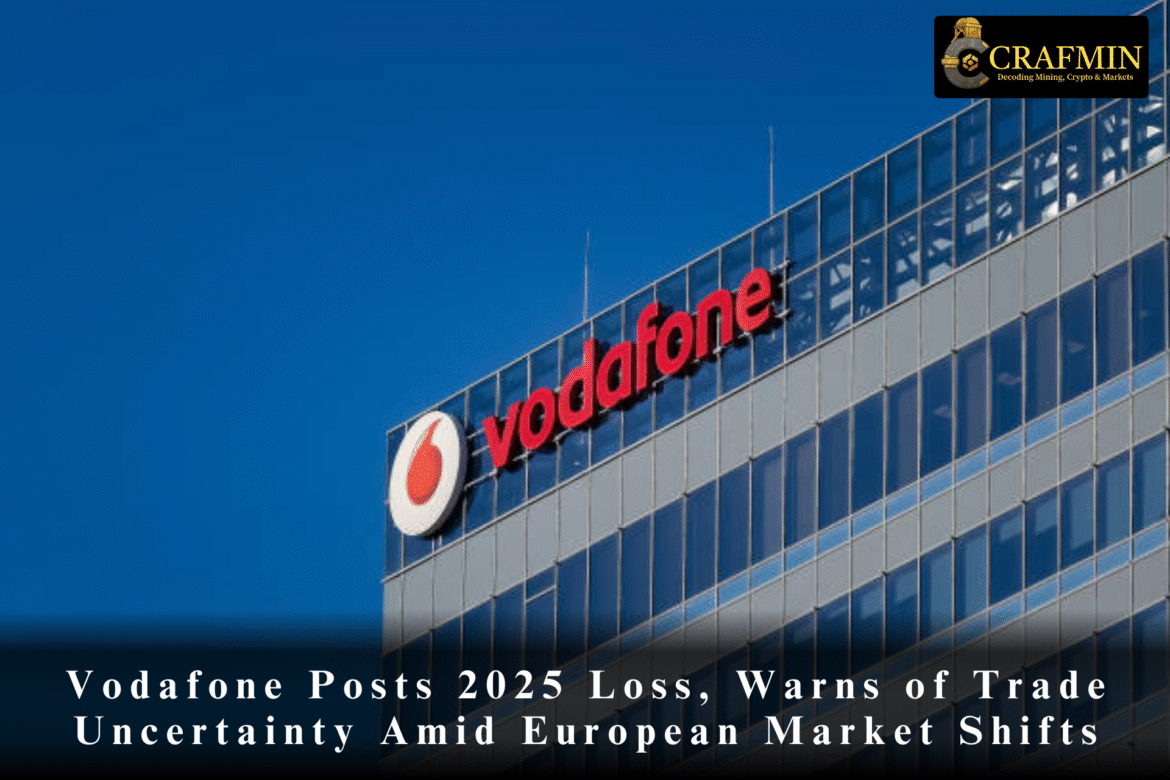Vodafone Swings to €411 Million Loss in 2025, Cites Impairments and FX Headwinds
LONDON — May 19, 2025 — Vodafone Group has posted a €411 million operating loss for its 2025 fiscal year, a sharp reversal from the €3.7 billion profit recorded in 2024. The telecom major attributed the downturn to €4.5 billion in impairment charges, primarily from underperformance in Germany and Romania, along with growing concerns around trade policy risks and foreign exchange volatility.
Despite the disappointing bottom line, Vodafone’s total revenue rose modestly by 2% to €37.4 billion, although it missed LSEG analyst estimates of €38.1 billion. The market responded with tempered optimism — shares rose 0.3% in early London trading after an initial dip at open.

Germany Underperforms, Dragging European Prospects
Analysts from JPMorgan noted that Vodafone’s 2025 results were broadly in line with expectations, but highlighted significant operational challenges in Germany, the company’s largest market.
“The company missed growth targets in broadband and failed to capitalize on Deutsche Telekom’s Q4 softness,” said Akhil Dattani, JPMorgan analyst.
Vodafone’s adjusted EBITDAaL came in at €11 billion, and the company issued narrowed guidance for 2026 of between €11 billion and €13 billion. Still, executives struck a cautious tone on the earnings call, citing continued FX volatility and uncertain trade dynamics across key European markets.
Trade Uncertainty, Currency Volatility Cloud Vodafone’s Outlook
Vodafone’s leadership warned that Brexit-related trade shifts, coupled with Eurozone inflationary pressures, are likely to remain central risks in 2026.
The British pound rose 0.2% to $1.338 on Tuesday, giving UK-listed firms a slight lift. But for multinationals like Vodafone, FX swings continue to challenge financial planning and revenue predictability.
UBS Slips on Fresh Capital Demand from Swiss Government
Swiss banking giant UBS saw shares fall 2.57% after Bloomberg reported the Swiss government may request an additional $25 billion in capital buffers. UBS is still navigating a complex regulatory landscape following its 2023 acquisition of Credit Suisse.
This added requirement underscores rising government scrutiny over systemic financial risks — even as UBS continues efforts to integrate Credit Suisse’s assets and streamline operations.
Greggs Reports 7.4% Sales Growth, Ramps Up Store Expansion
On the consumer front, Greggs delivered a rare bright spot in the earnings cycle. The popular British bakery chain posted a 7.4% jump in total sales for the 20 weeks ending May 17, with revenue reaching £784 million ($1.05 billion).
Fuelled by demand for iced drinks and expanded hot food options, Greggs also announced plans to open 140 to 150 new stores by year-end, having already added 20 new locations this year.
Kate Calvert of Investec reaffirmed a “buy” rating on Greggs, saying:
“Its forward PE of 14.5x doesn’t fully reflect the growth momentum or rising free cash flow. Product innovation is clearly working.”
Swiss Life Posts Strong Q1, But Shares Stay Flat
Swiss Life posted a 3% rise in Q1 fee income to 659 million francs ($791 million), alongside a 6% increase in premiums to 7.9 billion francs. Despite the solid performance, the company’s shares showed little movement — an indication of investor caution amid broader market uncertainties.
European Stocks Advance as Earnings Season Drives Optimism
By midday, European markets were trading higher, buoyed by strong earnings from key sectors and positive sentiment from central bank commentary.
- Stoxx 600: +0.7%
- FTSE 100 (London): +0.65%
- CAC 40 (Paris): +0.64%
- DAX (Frankfurt): +0.6%
The rally was helped by remarks from ECB Executive Board Member Isabel Schnabel, who highlighted a “historical opportunity for the euro area to expand its global economic influence.”
The euro has appreciated 9% year-to-date against the dollar, supported by U.S. protectionist trade policy shifts and improving Eurozone sentiment.
Vodafone Navigates a Cautious Path Toward 2026
Looking ahead, Vodafone appears to be in risk-management mode. The company is banking on regulatory easing in the UK and deeper product bundling strategies in Europe to stabilize growth. But ongoing trade uncertainty and currency volatility are likely to remain headline risks.
With analysts split on the telecom giant’s rebound potential, the next few quarters will be pivotal — not only for Vodafone, but for broader investor sentiment around Europe’s economic recovery and resilience.
This concludes our live blog coverage of Vodafone, UBS, and European corporate earnings for May 19, 2025. Stay tuned for further updates as the market continues to navigate a complex financial landscape.


